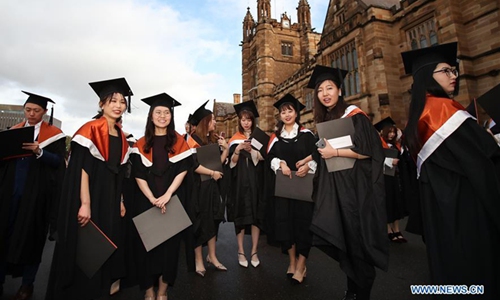Australian police in New South Wales are warning Chinese students about “virtual kidnappings” in which con artists concoct elaborate telephone scams that have so far defrauded victim’s families of at least $3.2 million in ransom payments.
The New South Wales (NSW) Police Force told the Global Times on Tuesday via e-mail that at least eight Chinese overseas students in New South Wales, Australia, have fallen victim to a “virtual kidnapping” this year.
A “virtual kidnapping” involves scammers, who pose as police or government officials somehow, convincing a student in Australia to fake their own kidnapping and then sending photos or videos of them tied up to the student’s family via WhatsApp or WeChat, demanding they pay large sums in ransom for the safe release of their child.
The NSW police say terrified parents then follow the “kidnappers” instructions and transfer the money to an unknown offshore bank accounts. Ransom payments have ranged from $20,000 to $500,000.
One victim’s father who lives in China paid $2 million after receiving a video of his 22-year-old daughter in Sydney tied up, said the police.
Initial contacts of the fraudsters, who usually speak in Putonghua, are made through phone calls, NSW police reveals. The fraudsters often claim to be representatives of Chinese authorities such as the Chinese Embassy or Consulate or the police.
“These scammers seem to be targeting vulnerable members of the Chinese-Australian community,” a senior police official said at a press conference on Monday.
The NSW police said the Chinese Consulate General in Sydney confirmed that no Chinese government official would ever contact students via mobile phones, nor would they demand money to be paid.
An undergraduate Chinese student at the University of Melbourne, who was blackmailed and paid some 600,000 yuan ($85,600) to a scammer about two months ago, told the Global Times on Tuesday that he has reported to the local police but hadn’t received any updates on his case.
The student requested anonymity.
The victim said the scammer spoke in Taiwanese accent and contacted him via WeChat and phone calls, saying he was an official with China’s national security department. He accused the student and his family of money laundering and demanded he send money to an account, otherwise his families account would be frozen.
The caller demanded he not inform anyone before transferring the money, claiming their calls were being monitored.
Another Chinese student studying at the University of Sydney, who also requested anonymity, told the Global Times he was also contacted by fraudsters, but he saw through the scam.
“The scammer pretended to be an official with the Chinese immigration authority. He threatened that he would prevent me from reentering China if I didn’t give him money,” said the student.
Other Chinese students in Australia told the Global Times they too had been contacted by con artists, but didn’t fall victim to their farfetched attempted scam. They said international students are vulnerable to such threats because they don’t have real support in the country.
China’s Embassy in Australia in late April also warned Chinese nationals to beware of telecom fraud posing as embassies’ and consulates’ staff.
Graduates are seen at the campus of University of Sydney, Australia, June 5, 2019. File Photo: Xinhua



